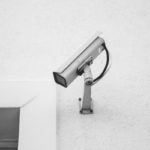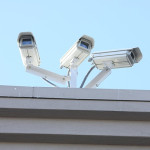What You Need To Know About Wired Security Cameras
So you’ve been debating between wired and wireless security cameras and you’ve finally made a decision to install wired security cameras. Here’s what you can expect:
Additional Equipment
When you purchase a wired security camera system, it will likely come with a DVR box, security cameras, and sometimes the necessary cables. However, the monitor, mouse, and keyboard (all of which are required for a wired security system) will need to be purchased separately.
Unless you have these items sitting around your home, it’s important to factor the cost of these additional items when you are shopping for a system. The only way you may be able to get around this is if you were to connect your cameras to a NAS that is already managed from your computer.
Cable Planning
Your security cameras need to be directly connected to the DVR box, therefore, you will need to be creative with how and where you will run cables across your home. Where you mount your cameras and the location of your DVR box will determine the cable routes. If you are doing this yourself, there are a few things to keep in mind.
Before beginning, make a plan and know the exact layout of your house. Also, find out if anything is in between your walls such as insulation or fire blocks that could potentially hinder cable runs. Map out your cable route before beginning the process, and invest in the proper tools to help you accomplish this task.
The Dirty Work
Again, if you will be installing your wired security camera yourself, be prepared to get your hands dirty. If you’re lucky, you may be able to simply run cables down through the floor, across the basement, and up through the floor on the other side of the house. However, you may be required to crawl through attics and crawlspaces. With that said, wear the appropriate attire and invest in good knee pads to protect yourself.
Network Connection
The benefit of having a wired security camera system is that you don’t need to connect it to the internet for it to work. The downside is that you cannot access it remotely when you’re away from home. While keeping your cameras off of the internet can be a safer bet, if you want to view your feeds remotely, you may want to consider connecting your cameras to your network.
If you need help choosing a wired security camera system and installing it, feel free to call 888-203-6294 or visit SecurityCamExpert.com. You can also connect with us on Facebook, Google+, Twitter, LinkedIn, and Pinterest.
Building The Ideal CCTV Surveillance System
When it comes to securing your property, CCTV cameras can be very effective. However, because there are a wide variety of CCTV cameras suited for different applications, if they are not properly implemented, their effectiveness may be compromised.
Before choosing your surveillance system, review the different types of CCTV cameras and the application for which they are best suited.
Different Types Of CCTV
Dome Camera
- Commonly used for indoor surveillance
- The ambiguous shape & design acts as a deterrent as criminals are unsure which way the camera is facing
- Ease of installation
- Vandal-proof features
- Infrared capability
Bullet Camera
- Long, cylindrical shape ideal for long distance viewing
- Better suited for outdoor use
- Protective casings safeguard against dust, dirt, and other natural elements
- Compact size makes for easy installation and mounting with bracket
- Fitted with either fixed or varifocal lenses depending on the requirements of the intended application
- Adaptability (can be used indoors and outdoors)
- High quality image resolution
C-Mount Camera
- Detachable lenses allow for simple lens changes to fit different applications
- Specialized lens use allow these cameras the ability to cover distances beyond 40ft
- Can support changes in technology
- Effective for indoor use
- Bulky design and presence acts as a deterrent
Day/Night Camera
- Can operate in both normal and poorly lit environments
- They utilize extra sensitive imaging chips (instead of infrared illuminators)
- Ideal for outdoor applications in which IR cameras do not function optimally
- Record in both color and black & white
- Wide variety of sizes available
- IR (Infrared) capability
PTZ (Pan/Tilt/Zoom) Camera
- Used with live guard or surveillance specialist operating the security systems
- Pan and tilt rotation
- Smart tracking features
- Powerful zoom and autofocus
What To Consider
Choosing the right CCTV camera for your property is important. You want to evaluate your needs to determine where you will place these cameras as well as their primary use in that location. Some factors to consider when choosing include the lens, sensor, and output resolution.
- Lens
The lens will dictate the quality of the image. The appropriate lens will allow your camera to focus and bring in enough light to the sensor, providing clarity and the ability to better identify things such as faces and license plates. A zoom lens will allow for further detail since it can adjust the light as it reaches to sensor for enhanced pictures and flexibility.
- Sensor
There are two types of sensors:
- CMOS (complementary metal oxide semiconductor)
- CCD (charged coupled device) cameras
CCD are more expensive than CMOS and produce clearer images (ideal for identifying faces and license plates).
- Output Resolution
Generally speaking, the more pixels, the better the picture. The highest resolution you can get is 700TL, but most cameras range between 300-550TVL. Be sure to match a resolution that your camera can produce because anything more is unnecessary.
Other Things To Consider:
- Discreet Vs. Visible
Box cameras are easier to be seen and clearly tell passersby that they are being recorded, which acts as a great deterrent. Dome cameras, on the other hand, are smaller and more discreet, making them ideal for monitoring larger areas such as front or backyards.
- Indoors Vs. Outdoors
Consider where you will place your cameras both indoors and outdoors. If you plan on placing them outdoors, you want to ensure they are in the best location and well protected (weatherproof and vandal proof housing). For indoor cameras, you want to make sure it will not be affected by things like grease or steam from the kitchen.
- Lighting Conditions
Whether indoors or outdoors, lighting will always change so it is advised that you test different camera models to see what works best with your lighting conditions. You also want to check for any reflections or backlighting during day or night.
- Image Clarity
This will depend on the size of the area you want to monitor. Thus, a camera situated in a small room need not be of high resolution. The resolution of your CCTV camera should reflect the landscape in order to provide effective images.
- Audio?
This depends on your personal preference (you should also look into the laws regarding audio recording if applicable). Some CCTV systems allow you to speak to the intruders, or you can have audio or alarms sound automatically when they reach a certain point. These tactics are meant to scare the intruders away before they can cause damage.
If you need help choosing the right CCTV surveillance system, call 888-203-6294 and we will be happy to help! You may also browse our selection online at SecurityCamExpert.com and connect with us on Facebook, Google+, Twitter, LinkedIn, and Pinterest.

